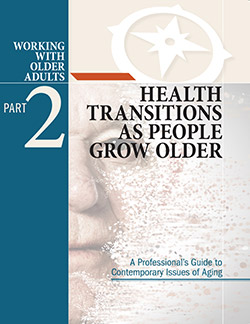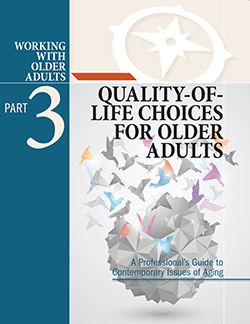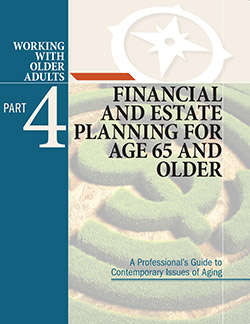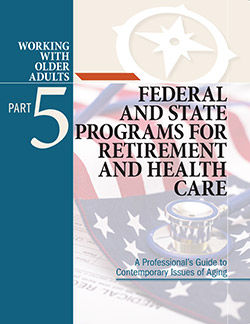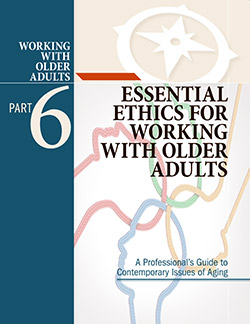Education
The Working With Older Adults Education Program


Course Curriculum
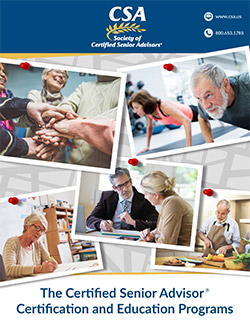 The Working With Older Adults course gives professionals a practical, comprehensive understanding of health, social and financial issues that are important to many older adults, including ethical issues specific to aging.
The Working With Older Adults course gives professionals a practical, comprehensive understanding of health, social and financial issues that are important to many older adults, including ethical issues specific to aging.
Written by experts, Working With Older Adults is based on key competencies for serving older adults identified by numerous professionals in a variety of areas through a comprehensive job task analysis.
The course offers evidence-supported knowledge with many real-world examples, tips, tools and resources. As a result, professionals are uniquely prepared to help older adults navigate the new, complex and changing needs of their later years.
Download the Working With Older Adults Course Brochure for additional information.
Working With Older Adults
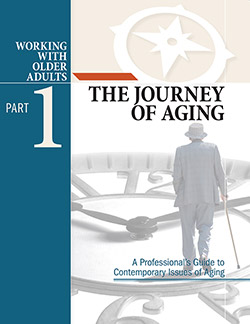
Part 1: The Journey of Aging
Chapter 1: Aging and Society
Chapter 2: The Experience of Aging
Chapter 3: Family and Social Support among Older Adults
Chapter 4: Best Practices in Communicating with Older Persons
Description
Discover the facts behind myths and stereotypes of aging, society’s view of aging, how to prevent ageism in your communications and what to do if you suspect elder abuse.
Individuals experience aging differently, but at the same time, many older adults share things in common, including certain attitudes and fears, and how they find support and connection through their families and in their communities.
Relationships are a crucial aspect of adapting to aging. Communication is key to relationships but is complicated by physical and cognitive changes of aging; some older adults feel they disappear from view as they age. This course provides you with evidence-based best practices for communicating with older adults from The Gerontological Society of America.
Use the practical knowledge and tips in this course in your professional communications and environment to enhance your ability to effectively identify and serve your client’s best interests.
Learning Objectives
Chapter 1: Aging and Society
- Explain the role society plays in the lives of older adults.
- Contrast the six different ways to measure age.
- Recognize key national legislation and social policies that affect older adults.
- Define ageism, give examples of it in society, and discuss ways to prevent it.
Chapter 2: The Experience of Aging
- Contrast the four major attitudes toward aging.
- Describe common fears and challenges of aging.
- Recognize signs of elder abuse and steps professionals should take if they suspect it.
- Explain how lifestyle and relationship factors impact older adults.
- Summarize how productive aging relates to retirement and later life employment.
- Explain why meaning is important and how older adults find it.
- Recognize signs of elder abuse and steps professionals should take if they suspect it.
- Describe the role technology plays in older adults’ lives.
Chapter 3: Family and Social Support among Older Adults
- Explain how concepts, structures, and forms of family are changing.
- Discuss why older adults need a social network and support system.
- Identify three bonds that foster close relationships.
- Define four types of social support.
- Describe the relationships that support older adults.
- Discuss the role of social media in older adults’ lives.
- Identify how professionals can help a family in crisis.
Chapter 4: Best Practices in Communicating with Older Persons
- Identify beliefs and behaviors older adults consider respectful.
- Explain how professionals’ lack of knowledge about aging affects older clients.
- State the five goals for becoming culturally competent.
- Give examples of how to bridge generation gaps.
- Describe the impact of sensory changes on communications.
- Identify factors for effective print, web, and in-person communication with older adults.
- Discuss how to enhance communication when a person has dementia.
- Explain strategies for increasing health literacy among older clients.
Participating in the Working with Older Adults Education Program does not guarantee passing the CSA Exam. The Working with Older Adults course is an independent self-study, which requires students to spend time reviewing and studying the course materials outside the live course or the online course options.
Education
Documents
Class Schedule
More Information
Stay updated with the latest news and information from SCSA.

